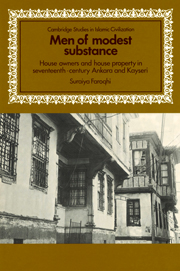Book contents
- Frontmatter
- Contents
- Tables
- Graphs
- Illustrations
- Figures
- Abbreviations
- Preface
- Introduction
- 1 Setting the scene: two cities of central Anatolia
- 2 The physical shape of urban houses
- 3 The cost of buying a house
- 4 Urban property-owners
- 5 The difficulties of an urban property-owner
- Conclusion
- Glossary
- Notes
- Bibliography
- Index
5 - The difficulties of an urban property-owner
Published online by Cambridge University Press: 18 November 2009
- Frontmatter
- Contents
- Tables
- Graphs
- Illustrations
- Figures
- Abbreviations
- Preface
- Introduction
- 1 Setting the scene: two cities of central Anatolia
- 2 The physical shape of urban houses
- 3 The cost of buying a house
- 4 Urban property-owners
- 5 The difficulties of an urban property-owner
- Conclusion
- Glossary
- Notes
- Bibliography
- Index
Summary
Property-owners of seventeenth century Ankara and Kayseri applied to the kadı' s court mainly to record transfers of real property. On the other hand, contested cases involving ownership or possession of a house were relatively few. But at the same time, records concerning contested cases usually contain much more incidental information than the entries dealing with ordinary sales. Thus these documents oppose a stubborn resistance to all attempts on the part of the researcher to reduce their contents to a standardized format, while at the same time allowing us to view aspects of Ankara and Kayseri society which the sales documents do not reveal.
All disputed cases discussed in the present chapter concern in one way or another the ownership or possession of houses. These matters were decided by the kadı according to the şeriat, for houses, unlike agricultural lands, were held as freehold property. As a result, the Sultans had promulgated no body of rules and regulations dealing with the ownership of houses and gardens, while they had done so in the case of fields and meadows. In principle, the latter were regarded as state property, in respect to which the cultivator could only claim an hereditary right of usufruct. On the other hand, ad hoc interventions on the part of the Ottoman central government were not excluded, even where freehold property was involved. But direct interventions were unusual, dictated by exceptional conditions such as rebellions and civil war. Under more normal circumstances, disputes concerning the ownership of houses were generally left to the local kadı to decide.
- Type
- Chapter
- Information
- Men of Modest SubstanceHouse Owners and House Property in Seventeenth-Century Ankara and Kayseri, pp. 182 - 201Publisher: Cambridge University PressPrint publication year: 1987



